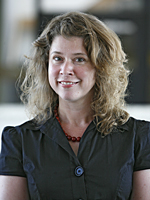Lisa Swanstrom is tapping the page
She explores how computers are changing the way we read

Lisa Swanstrom
It was, Lisa Swanstrom admits, an embarrassing moment. But it was one the Florence Levy Kay Fellow in the Digital Humanities didn’t mind sharing with her students. “I was reading a couple of different things, going back and forth between paper and the computer screen, and I kept trying to scroll down the page of paper with my finger,” she says, laughing. “It was really funny to me that these embodied cues that we don’t really question are treading on one another.”
It’s that nexus, where the printed meets the pixilated word, that drives Swanstrom’s research. She wants to know how computers, and more specifically the Internet, have changed the way we read and write. “This work is important to me because I, like many people in literary studies, am a ‘professional reader,’ which is to say that I read for a living,” Swanstrom says. “I consider it a privilege to live in a time in which the notion of what it means to read is going through both a process of expansion and a deeply reflective critical evaluation.”
Swanstrom went through her own critical evaluation when she started graduate school at the University of California, Santa Barbara to study, ironically, classics. When she arrived on campus, Swanstrom says she was “seduced” by the emerging digital humanities field. “I was lured away by all of the exciting things being done with narratives and computers,” Swanstrom says. “It just blew my mind and I realized that’s what I wanted to be working on.”
Now, Swanstrom spends her time scouring the Internet for what she calls “digital artifacts” that illustrate how digital technology has changed the way we interact with text. The online encyclopedia “Wikipedia,” where visitors can edit any of the two-million-plus subject pages, is a good example. While Swanstrom says she would never trust what’s written on Wikipedia for research, it’s the open, public way that information is compiled that makes the Web site so valuable to her. “Instead of just looking at a page layout, like we might do for a traditionally printed document, when we’re dealing with something posted online, we need to examine things on the level of the computer interface to understand the work fully,” she explains. “The study of reading in relation to digital technology is of vital importance to the public now more than ever. As exciting as it is to witness the emergence of new literary forms, we also need to be able to think about such texts critically, to situate them historically, and to act responsibly as readers when we engage with them.”
As for her own reading habits, Swanstrom says she still prefers the tangible experience of picking up a good book to scrolling down the computer screen. Even if, on occasion, she finds herself tapping the page.
• For more on Swanstrom’s research interests, check out "esc for escape," which is one of her favorite digital artifacts online. “What I think is so great about this piece is that when people work with computers, there’s a whole variety of operational systems going on in the background that most of us know nothing about,” Swanstrom says. “They’re fairly invisible. You don’t even think about them until you get an error message and then, suddenly, this whole other language is revealed.”





